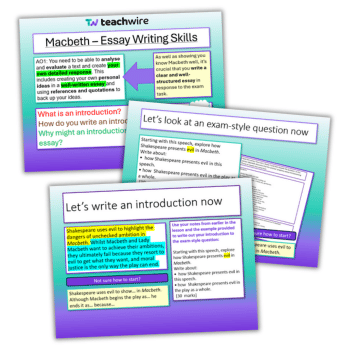Essay skills are essential for GCSE English Literature students in their exam answers. This detailed Macbeth essay two-lesson resource pack contains two comprehensive PowerPoints which will support KS4 students in constructing coherent and clear essay structures for an exam-style question.
The pack includes:
- a Macbeth essay exam-style question
- detailed teacher and student notes in response to an exam-style question
- modelled Macbeth essay introduction examples
- clear and relevant learning outcomes
- approaches to adaptive teaching
- differentiated tasks to offer additional support
- success criteria
- peer assessment opportunities and more
Use this resource to help students prepare in the weeks leading up to exams. You can also use it as a mock paper and embed it into other Macbeth schemes of work.
Macbeth evil essay
The first Macbeth essay lesson focuses on creative introductions which answer the task and prepare an overall structure for a student’s response to a GCSE English Literature task. We focus on the use of evil in Shakespeare’s Macbeth.
The second lesson focuses on balancing essay structures so that students ensure they spend enough time on exploring the provided extract, as well as analysing the play as a whole.
Lesson 1: Macbeth essay introductions
We begin by exploring what an introduction is and consider how we can use them and why they are effective for writing GCSE responses.
Next, we explore a specific Macbeth essay example question and a model introduction, using relevant and student-friendly success criteria. This then segues into helping students to write their own introductions for the same Macbeth essay exam task.
Finally, students use their success criteria to critique and peer assess their classmates’ introductions, providing a springboard for students to continue to develop an overall essay structure for this example and other essay tasks in the future.
Learning outcomes
- Describe the key elements of an essay introduction
- Explain how we can create an effective introduction to a Macbeth essay
- Evaluate the effectiveness of our introductions based on success criteria
Lesson 2: Extract and whole play analysis
We begin by breaking down a Macbeth essay exam-style question and discussing which areas of the text we need to cover in exam conditions.
Next, we analyse the extract provided and make clear and detailed notes on the theme of evil within the speech.
Students are given potential ideas to include in an essay on this theme as part of their whole class feedback.
Moving on, we explore what other potential areas of the text we could include in the example Macbeth essay. Students are given time to use their notes from this lesson and previous revision sessions to plan out an essay structure in response to the provided Macbeth task.
Finally, students peer assess their Macbeth essay plans based on class success criteria.
Learning outcomes
- Describe the key elements of a Macbeth exam essay
- Explain how we can create an effective essay for a Macbeth essay
- Evaluate the effectiveness of our essay plans based on success criteria
Structuring an English Literature essay at GCSE
Students spend many lessons and revision sessions building and consolidating knowledge on characters, themes, plot, language analysis and context.
However, sometimes there’s not as much devoted to supporting students in putting together cohesive essay structures that help to organise their thoughts in exam conditions and improve the overall quality of their writing.
This is despite these areas being explicitly mentioned in exam board specification mark schemes and assessment objectives.
More Macbeth resources
- Complete Macbeth GCSE teaching and revision resources
- Using Banquo’s words to dive deep into William Shakespeare’s play
- Key Lady Macbeth quotes to study
- Macbeth key quote posters and worksheet
- AQA English Literature Paper 1 Macbeth/Christmas Carol walkthrough
The EnglishGCSE.co.uk team has over a decade of teaching experience in UK secondary schools. The team creates free and inexpensive lessons and resources for KS3-KS5.














